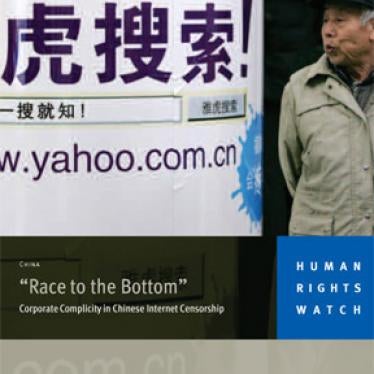Last month, Google - one of the world's most important technology companies - stood up to the Chinese government by making it clear that it will not be complicit in censoring information and ideas.
For years, corporations - including Google, Yahoo!, and Microsoft - have bent to the Chinese government's will by engaging in preemptive self-censorship. Human Rights Watch documented this extensively in our 2006 report, named "Race to the Bottom": Corporate Complicity in Chinese Internet Censorship.
We released this report shortly after a US congressional hearing where Google, Yahoo!, and Microsoft were criticized for how they operated in China. When newspapers and television shows reported on their actions, Human Rights Watch used the resulting public relations nightmare to convince these companies to discuss - and ultimately accept - the creation of voluntary industry standards.
After two years of intense negotiations involving the companies, Human Rights Watch, and other groups, the Global Network Initiative(GNI) was born.
Members of GNI agree to protect freedom of expression and user privacy, and they even create corporate policies to ensure compliance. Unlike some voluntary industry standards, GNI members also agreed to independent monitors, and the resulting reports on members' actions are made public. If a member company fails to comply, it can be rejected from the initiative - a potential public relations disaster that publicly traded companies want to avoid.
Google was initially among the companies most resistant to joining GNI. Then, in January, Chinese authorities attempted to hack into the Google accounts of several prominent human rights activists. Shortly thereafter, Google made front-page news in announcing that it was prepared to leave China if the government continued to censor its online content. The historic announcement was a momentous step forward in ending internet companies' complicity in the suppression of online freedom of speech.
Following Google's announcement, House Speaker Nancy Pelosi made an unprecedented call for regulation to ensure that companies respect human rights. A few weeks later, Secretary of State Hillary Clinton announced a groundbreaking policy on internet freedom that calls for a comprehensive approach by the government to counter threats to human rights online. She called on companies to act responsibly. And she singled out GNI as a key initiative working to protect human rights.
Just last month, Google announced that it would cease censoring its Chinese search engine. The company also threatened to publicize any attempts by the Chinese government to block access to the site. Google, it seems, has decided to stop being part of the problem and instead be part of the solution.
Now it is up to other companies to follow Google's lead. We are pressing more companies to adopt GNI standards, while also calling for federal laws to make it illegal for internet companies to take part in censorship or to share private user information. With these steps, we will create a stronger foundation for internet freedom around the world.







